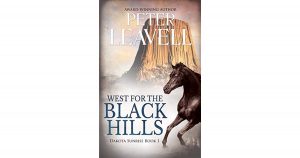by Peter Leavell, @PeterLeavell

In chronological order, the following are the harbingers of my personal writing doom:
My great grandmother and then grandfather died.
Family health issues.
I stopped making testosterone and was so weak I couldn’t stand up.
I landed a fantastic book contract.
My younger brother’s death from cancer.
Getting a master’s degree and landing a literature teaching job.
My father in law’s death.
After tragedy and success, there is a time when I can’t write. I’m not in a healthy place to put words on paper. And after speaking with hundreds of other writers, you are as well.
That’s cool. Life happens. Life gives us material for our novels. But what do you do when you’re ready to write again?
You could act like me and leap in headfirst. Yet, within a few days—or even one afternoon—my mind and heart return to a choking grief and inadequacy, and soon my writing time turns into an unhealthy struggle. Any words I put on paper needed to be drastically revised.
Baby Steps
I learned baby steps are key. I now proceed slowly into the writing life. I take days. Weeks. I emotionally heal. I mentally prepare so that I am in a good place to work the craft, not wrestle with writing. Like exercise after injury, I’m looking for recovery.
When I’m ready, I start with five minutes of writing that day. Just five. I see how it goes. I refuse to strain or push. If I feel that way, I take the pressure as a sign I need to pause. I try it again the next day, putting words on a page, maybe enjoying the moment a little longer. The cobwebs begin to clear.
I’m going to be frank and use a strong tone of voice now. Do not beat yourself up for having a hard day and you can’t write. It’s not your fault. This isn’t about blaming something or someone. Life’s just hard. And sometimes you must heal. It’s in healing we get our material. Just live the recovery, and know you’ll be a better person for taking your time.
On an alternative note, sometimes the best literary classics have been written under duress and pain. Woolf. Hemingway. Plath. Cobain. Wallace. Unfortunately, theirs, and many other lives didn’t end as well. Proceed at your own risk.
Baby steps. Move ahead slowly, awakening the love and passion you had for your craft and your characters. Build a healthy consistency that will last so that you will return to fine writing form, and bless the world not only with your work, but with a healthy, happy you.
Philip Anderson keeps his past close to the vest. Haunted by the murder of his parents as they traveled West in their covered wagon, his many unanswered questions about that night still torment him.
His only desire is to live quietly on his homestead and raise horses. He meets Anna, a beautiful young woman with secrets of her own. Falling in love was not part of his plan. Can Philip tell her how he feels before it’s too late?
With Anna a pawn in the corrupt schemes brewing in the nearby Dakota town, Philip is forced to become a reluctant gunslinger. Will Philip’s uncannily trained horses and unsurpassed sharpshooting skills help him free Anna and find out what really happened to his family in the wilderness?

Peter Leavell, a 2007/2020 graduate of Boise State University with a degree in history and a MA in English Literature, was the 2011 winner of Christian Writers Guild’s Operation First Novel contest, and 2013 Christian Retailing’s Best award for First-Time Author, along with multiple other awards. An author, blogger, teacher, ghostwriter, jogger, biker, husband and father, Peter and his family live in Boise, Idaho. Learn more about Peter’s books, research, and family adventures at www.peterleavell.com


Comments 1
Wise words. Thank you for sharing them as I needed the confirmation and so do many others. We can move on to write after tragedy. Peace and comfort to you, Peter.